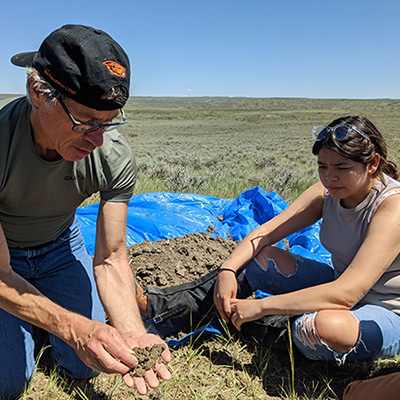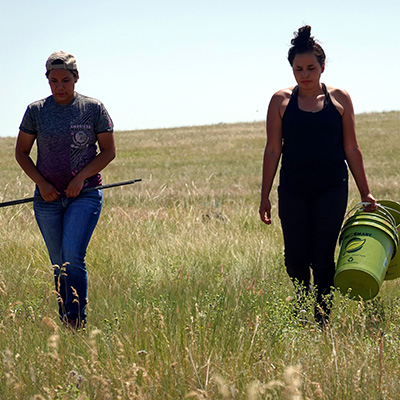TEK Lab Projects

BLM Pacific Northwest (PNW) Tribal Forest Restoration and Native Seed Project
In this three-year Pacific Northwest ethnobotany, seed collection, and Tribal conservation corps ecocultural restoration pilot project, we are helping create forests more resilient to climate change, working in southwest Oregon on Bureau of Land Management (BLM) Oregon & California (O&C) lands, using Traditional Ecological Knowledge (TEK), in partnership with Tribal Nations in that region. Our goal is to provide as many job and education opportunities for Tribal youth as possible within the CoF. We hope to help develop Tribal seed-growing businesses, building on current work done by some Tribal Nations, and co-creating an ecocultural restoration plan for federal land.
This project honors and observes the highest respect of Tribal sovereignty and nation-to-nation relationships. Non-Tribal partners include the Society for Ecological Restoration, Institute for Applied Ecology, and Forest Bridges. Potential Tribal partners include the Confederated Tribes of Coos, Lower Umpqua and Siuslaw Indians, the Confederated Tribes of the Grand Ronde, the Confederated Tribes of the Siletz, the Coquille Indian Tribe, and the Cow Creek Band of the Umpqua Indians. Prior to submitting this grant, we engaged with their natural resource directors individually for guidance. We will continue to engage with them, and cultural leaders and elders in each Tribal Nation as we co-create partnerships that best reflect each community’s unique needs. BLM is giving us the flexibility to adapt our project to best meet the needs of our partners.
Specifically, we are implementing DOI National Seed Strategy and Plant Conservation and Restoration Program protocols to collect seeds of culturally and ecologically significant plants on BLM lands. We are assessing soil processes, seed banks, and forest understory and overstory structure, as well as wildlife habitat. All work is being done using TEK best practices, which include reciprocity. Data collected on culturally significant plants will be protected and not made publicly available, without permission of the Tribal Nations involved.
Lead Principal Investigator: Cristina Eisenberg
Co-Principal Investigators: Thomas H. DeLuca, Christopher J. Dunn, Thomas Kaye, and Si Gao

OSU/BLM/Fort Belknap Indian Community Grassland Restoration Project
This five-year project expands the interdisciplinary ethnobotany and TEK pilot project initiated by Dr. Eisenberg in 2019 in partnership with the US Federal Bureau of Land Management (BLM) and Fort Belknap Tribal Nations (Aanniiih and Nakoda), collectively referred to as Fort Belknap Indian Community (FBIC). Other partners include the Society for Ecological Restoration, US Fish and Wildlife Service, Aanniiih Nakoda College, Smithsonian Institute, and World Wildlife Fund.
Our native plant, soils, and pollinator ecocultural restoration project is continuing to implement DOI National Seed Strategy and Plant Conservation and Restoration Program protocols to collect seeds of culturally and ecologically significant plants on BLM lands to help ensure a stable and economical supply of native plant materials for restoration of public lands. We are working on BLM lands surrounding the Fort Belknap Indian Reservation, and to a limited extent on FBIC lands. Primary activities consist of deepening work we have previously done here, such as sampling Assessment, Inventory, and Monitoring (AIM) plots and making Seeds of Success collections of native seeds. Additional activities include ethnobotany, soil health, and pollinator surveys. We are doing cooperative work on wildlife habitat conservation on BLM land, Tribal land, and other north-central Montana lands and continuing the FBIC Community Fellows Program—a Tribal youth conservation corps that provides STEM education and employment for FBIC members. Community Fellows learn ecological survey methods for soil health, pollinators, ethnobotany, and wildlife; how to use TEK in field sampling; and create an ecocultural restoration plan.
Our project supports BLM objectives of exploring the nexus between BLM management and its effects on Tribal lands, and empowering Tribal Nations. It benefits the American public by advancing the science and practice of ecocultural restoration to sustain biodiversity, improve resilience in a changing climate, and re-establish a healthy relationship between nature and culture. Our work is increasing awareness of Tribal sovereignty and self-determination, helping establish guidelines for working with Tribal Nations in a fair, equitable, and just manner, and advancing Diversity, Equity, and Inclusion by providing opportunities to benefit underserved youth and their communities through STEM education, jobs, and influx of resources.
Lead Principal Investigator: Cristina Eisenberg
Co-Principal Investigator: Thomas H. DeLuca
Recent Press:
- BLM Director tours Fort Belknap's 'Seeds of Success' program, Yahoo News, July 17, 2023
